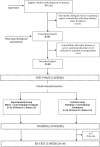Music Training Increases Phonological Awareness and Reading Skills in Developmental Dyslexia: A Randomized Control Trial
- PMID: 26407242
- PMCID: PMC4583182
- DOI: 10.1371/journal.pone.0138715
Music Training Increases Phonological Awareness and Reading Skills in Developmental Dyslexia: A Randomized Control Trial
Abstract
There is some evidence for a role of music training in boosting phonological awareness, word segmentation, working memory, as well as reading abilities in children with typical development. Poor performance in tasks requiring temporal processing, rhythm perception and sensorimotor synchronization seems to be a crucial factor underlying dyslexia in children. Interestingly, children with dyslexia show deficits in temporal processing, both in language and in music. Within this framework, we test the hypothesis that music training, by improving temporal processing and rhythm abilities, improves phonological awareness and reading skills in children with dyslexia. The study is a prospective, multicenter, open randomized controlled trial, consisting of test, rehabilitation and re-test (ID NCT02316873). After rehabilitation, the music group (N = 24) performed better than the control group (N = 22) in tasks assessing rhythmic abilities, phonological awareness and reading skills. This is the first randomized control trial testing the effect of music training in enhancing phonological and reading abilities in children with dyslexia. The findings show that music training can modify reading and phonological abilities even when these skills are severely impaired. Through the enhancement of temporal processing and rhythmic skills, music might become an important tool in both remediation and early intervention programs.Trial Registration: ClinicalTrials.gov NCT02316873
Conflict of interest statement
Figures



References
-
- Ziegler JC, Goswami U. Reading acquisition, developmental dyslexia, and skilled reading across languages: a psycholinguistic grain size theory. Psychol Bull. 2005; 131(1):3–29. - PubMed
-
- Ramus F. Neurobiology of dyslexia: A reinterpretation of the data. Trends Neurosci. 2004; 27(12): 720–726. - PubMed
-
- Wolff PH. Timing precision and rhythm in developmental dyslexia. Read Writ. 2002; 15:179–206.
Publication types
MeSH terms
Associated data
LinkOut - more resources
Full Text Sources
Other Literature Sources
Medical

